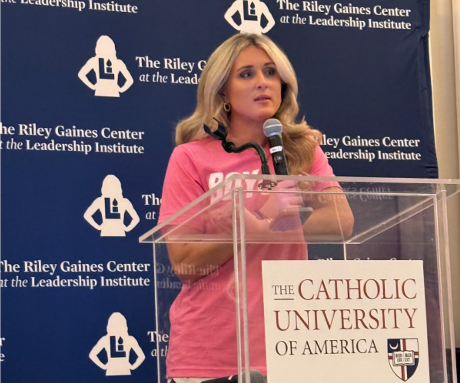Swimming Against the Current: Riley Gaines Visits CUA

Image courtesy of Francesca Jonica
By Francesca Jonica
A former collegiate swimmer from Nashville, TN, Riley Gaines competed for the University of Kentucky and gained national recognition for speaking out against the inclusion of transgender women in women’s sports. On Thursday, November 21 Riley Gaines visited Catholic University to speak about her experiences and the broader issues surrounding women’s sports.
In the 2021–2022 swimming season, Gaines, a senior swimmer at the University of Kentucky, tied for fifth place in the NCAA National Championship with Lia Thomas, a transwoman from the University of Pennsylvania. Gaines shared how this experience shaped her perspective, sparking her journey to becoming a vocal advocate for what she sees as the integrity of women’s sports.
Gaines explored the broader implications of Title IX in the context of her championship experience.
“Isn’t this everything that Title IX was passed to prevent?” Gaines asked,questioning how policies designed to protect opportunities for women now allow for scenarios that she perceives as unfair.
Gaines expressed frustration over changes made under the Biden-Harris Administration, which she claims reinterpreted Title IX to equate sex with gender identity.
“What they’ve done is equate sex with gender identity,” Gaines stated. “These two words mean the same thing now, according to this administration.”
The Department of Education published a rule amending Title IX regulations on April 29 of this year. The amendment was focused on the definition of “discrimination on the basis of sex” and “sex-based harassment”, which now include “discrimination based on sex stereotypes, sexual orientation, gender identity, and sex characteristics.” In the preamble, the Department addresses that a person’s gender identity “may or may not be different from their assigned sex at birth” and does not redefine the term “sex.”
Throughout her speech, Gaines criticized how women are increasingly referred to using alternative terms, such as “birthing person” or “menstruator.” She shared a personal anecdote about being addressed in this way during a routine medical appointment. Her broader critique centered on the erosion of language and identity, asking, “How can you expect someone else to stand up for you if you’re not even willing to stand up for yourself?”
She also highlighted her concern about the silencing of dissent, noting how athletes like herself and others have been discouraged from speaking out through what she described as emotional blackmail and institutional pressure. Gaines recalled her alma mater’s efforts to educate athletes by requiring them to take sensitivity training aimed at teaching new pronoun usage.
Gaines concluded her talk with a challenge to the audience: to raise awareness and take action in defending women’s sports. She emphasized that only through collective advocacy could these issues receive the attention they deserve. Lucy McHale, a junior nursing student, shared her thoughts about the talk.
“I think Riley Gaines coming to CUA re-ignited in a lot of people the importance and difference between men and women,” McHale said. “I also think that it reiterated the truth: men and women are fundamentally and biologically different. One of the main takeaways from the talk was this—there is an indisputable difference between men and women, and both have to be protected from modern ideology that seeks to disrupt the truth of these differences.”
Riley Gaines’s visit to Catholic University offered a personal perspective on a complex and evolving issue. Her message sparked reflection among attendees, underscoring conversations shaping the future of sports and society today.






